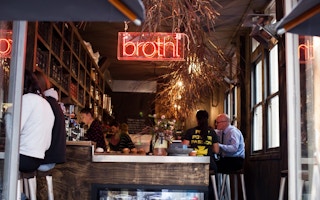Brothl – a soup eatery which uses waste from high-end restaurants to cook broth- will close next week following a long-running dispute with the City Of Melbourne, the Melbourne Age reports.
The popular sustainable eatery, which has attracted worldwide attention, was issued an eviction notice after it refused to pay the City Of Melbourne $12,500 to store its composter outside.
Founder and owner Joost Bakker told the publication he established the café in response to the huge volume of waste generated by Melbourne’s hospitality industry.
“My idea behind the business was to showcase that you could have a hospitality business that can have zero waste,” the former florist said.
“
In three years there were no wheelie bin collections, we turned almost 140 tonnes of organic waste into 20 tonnes of nutrient rich compost.
Joost Bakker, founder and owner of Brothl
The café composts the establishment’s food waste using a composter stored in a laneway near the restaurant next to the wheelie bins.
Similar in size to a wheelie bin, the composter turns waste into compost and reduces the volume by about 90 per cent.
Melbourne City Council reportedly told Mr Bakker is he wanted to continue to store the composter in the laneway he would need to pay $12,500 and sign a contract to accept all liability.
“In January we were notified by the City of Melbourne that they would take us to VCAT for the cage that holds the composter. After three years of going back and forth and being asked to sign incredibly complex contracts, my lawyers advised me to walk away,” he posted to his Facebook page.
“Without the composter I simply can’t operate a zero waste restaurant.”
Last month the café was served an eviction notice – which Joost says is a disappointing end to the project.
“I’m incredibly proud of what we have achieved. In three years there were no wheelie bin collections, we turned almost 140 tonnes of organic waste (equivalent to 7 garbage trucks) into 20 tonnes of nutrient rich compost and best of all I feel we have started a worldwide movement that’s got many restaurants now separating their organic waste and providing natural fertilisers for our future food,” he added.

















